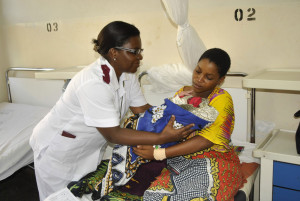by Ben Taylor
Cholera outbreak prompts unusual response
An outbreak of cholera that begun in August 2015 in Dar es Salaam had claimed 100 lives by early November. The first cases were recorded in Kinondoni Municipality, and it quickly spread to Temeke and Ilala. Over 7,500 cases have now been reported from 39 districts in 17 regions.
To stem the spread of the disease, authorities in Dar es Salaam took steps to improve water quality and hygiene across the city. This included destroying shallow wells and installing new facilities for water tankers to collect water from.
President Magufuli drew on the outbreak to provide a focus for his alternative approach to Uhuru Day on December 9. Instead of the usual national ceremonies and celebrations, he called for the funds to be saved for more important activities and called on Tanzanians to spend the day cleaning up their local environment.
Tanzania certified as polio free
19 years after the last case of polio in Tanzania, the country has been officially declared polio free.
In a statement, UNICEF said that “this achievement in turning the tide against polio is the result of political will and government leadership in the country.” Coordinated efforts with communities comprised routine vaccination at health facilities, and specific efforts in high-risk areas targeting hardto-reach population. Other approaches included training support to thousands of front-line workers in communities as well as campaigns and polio surveillance activities.
Dr Donan Mbango, the Permanent Secretary in the Ministry of Health said that vaccine coverage had been maintained at 90% nationally, and that polio surveillance will continue. “UNICEF will continue to work with the Government and its partners to ensure all children are reached and are glad to note polio vaccination will continue. We cannot let down our guard, as there could be a re-emergence and we must be vigilant,” said UNICEF’s Deputy Representative in Tanzania, Paul Edwards.
Heart and kidney hospital in Dodoma
A specialist heart and kidney hospital at the University of Dodoma was officially launched by President Kikwete in mid-October. The Benjamin Mkapa Ultramodern Hospital, reportedly the third of its kind in Africa, will also serve as the referral hospital for Dodoma and Singida regions.
Speaking at the launch, President Kikwete said that the facility would reduce the cost of sending patients abroad for treatment. “I am pleased that the plan hatched several years ago of having such a modern facility in effort to improve provision of health services to Tanzanians has become a reality,” he said. (The Guardian)
Progress in child and maternal mortality

New born baby at Muhimbili Hospital, Dar es Salaam (photo Michuzi http:// issamichuzi.blogspot.co.uk/)
A recently released report from the World Health Organisation, UNICEF and others shows that maternal mortality in Tanzania has fallen sharply between 1990 and 2015. The data confirms that Tanzania is making progress in battling maternal and newborn mortality.
“Since 1990, Tanzania has reduced under-five mortality by nearly three-quarters and maternal mortality by more than half,” noted Melinda Gates of the Bill and Melinda Gates Foundation. (Daily News)
Birth registration by mobile phone
Tanzania has launched a nationwide system of birth registration via mobile phone. The system has been established by the government registration agency RITA, UNICEF and the communications company TIGO. The new system, which will be rolled out across the country over the next five years, allows a health worker to send the baby’s name, sex, date of birth and family details by phone to a central data base and a birth certificate is issued free of charge in days.
The country has one of the lowest rates of birth registration in eastern and southern Africa. Only 20% of Tanzanians – and less than one in 10 under-fives – have birth certificates, according to the 2012 census. Parents have to pay TSh 3,500 if they request a birth certificate within 90 days of a child’s birth, or TSh 4,000 afterwards, as well as travel costs.
The government expects to register about a million children under the age of five before the end of this year, and 90% of all newborns within the next five years.
Anna Mbelwa, who gave birth to a baby boy at Mbalizi Hospital in Mbeya Region this month, said the initiative made a big difference. “I was very impressed because it usually takes a long time to get a birth certificate,” said Mbelwa. “It was very inconvenient before since parents had to travel a long distance to the district registrar only to be told their children’s files were missing.” she added. (The Guardian)
